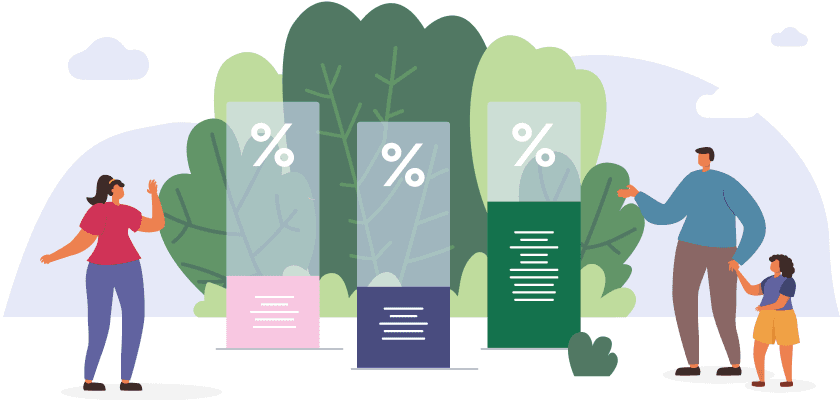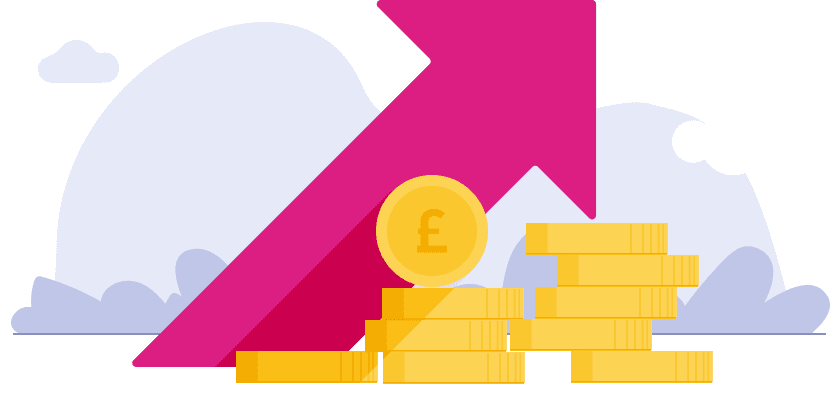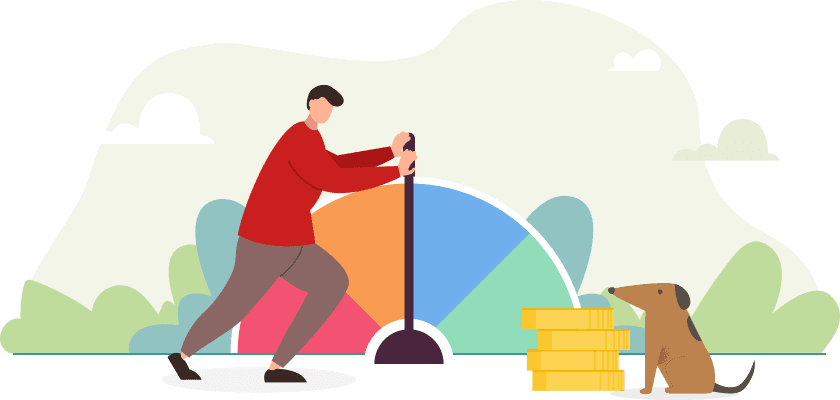Your A to Z of workplace pensions

Getting the hang of pensions can feel as tough as learning a language. With every new letter or email comes a new technical term or abbreviation. It’s exhausting! But it’s also important.
So let’s brush up on your ABCs, build your confidence, and make pension perplexity a thing of the past.
Auto enrolment
Employers are required by law to set up a pension for you AND top it up. But some companies are better than others at keeping in touch, so you could have a pension and not even realise it!
These workplace pensions require you to pay in at least 5% of your wages. In addition, your employer has to pay in at least 3%. So it’s effectively a pay rise!
Beneficiaries
You can choose who gets your pension if you don’t use it all up in your lifetime. These are called your beneficiaries and you can choose as many as you want, splitting up your savings between your nearest and dearest.
If you’re with NatWest Cushon, you can manage your beneficiaries in the Cushon app. It’s in the settings menu.
Contributions
When you or your employer save money into your pension, it’s called a contribution.
You can set up regular contributions (they’re automatic through payroll with us), as well as lump sum contributions when you have some extra cash lying around.
NatWest Cushon emails you each month so you can see the total you and your employer contributed that month.
Drawdown
One of the ways you can access your pension savings when you’re at least 55. If you choose drawdown, you’re free to take your money as and when you need it, leaving the rest invested. But be careful – when it’s gone it’s gone!
Another popular option is an annuity, which exchanges your full pension pot for a regular income that lasts a lifetime.
Environmental impact
All pensions invest your money and all investments affect your carbon footprint. In fact, the carbon emissions associated with your pension are likely the biggest part of your carbon footprint. So even if you’re great at recycling, you’re still impacting the environment.
However, some pensions take a stand. Our pension is climate-focused, directing your money to investments in renewable energy, reforestation and other projects that do good. It does wonders for your carbon footprint!
Fund
There are different types of investment. Funds, like a multipack, give you a mixture of them.
Funds are particularly popular in pensions because they’re a great way to diversify your investments – to spread them out so you don’t have all your eggs in one basket. They also come in lots of flavours, grouping different investments for different reasons. For example, we like funds made up of climate-focused investments from all around the world.
Greenwashing
When a company claims to be more environmentally friendly than it actually is, that’s called greenwashing. It’s a problem you might see in sustainable fashion or organic food – the packaging might say it’s ‘sourced responsibly’ but is it really?
In finance, greenwashing commonly refers to pensions or investment funds that come with a ‘sustainable’, ‘responsible’ or ‘green’ label but fail to meet the accepted standards. Effectively, they’re pulling the wool over people’s eyes. Not okay.
HMRC
His Majesty’s Revenue and Customs. Among other things, they’re the government body responsible for taxes, including the tax relief you get on pension savings.
When you save into your pension, HMRC gives you 20% tax relief. So if you save £100 into a pension, you only pay £80 – the other £20 comes from the government. They’re essentially giving you back the income tax you paid when you earned that money. (So if you’re a higher rate earner, you get 40% back).
Investments
All pensions invest your money so it can grow into more money (though the value goes up and down over time). And because a pension looks after thousands of people’s money, it can invest at a much larger scale than an individual could, potentially gaining access to better deals and opportunities.
Our pension fund, the Cushon Master Trust, invests 75% in equity, 10% in bonds and 15% in private markets. That covers thousands of companies and projects across the globe.
Junior ISA
It is possible to open a pension for a child because there’s no minimum age, but a better option could be a Junior ISA. Kids get access to the money from 18, not 55, so it’s a savings vehicle that can benefit from long-term investing (or just hold cash) but doesn’t require a lifetime of waiting. Much better for a foot in the door as a young adult.
Kinds of pension
There are three main kinds of pension. The first is a personal or private pension, which you choose and manage yourself – you can also get a self-invested personal pension, giving you even more control.
The second is a workplace pension, which your employer sets up to work automatically, saving money into your account every time you’re paid. That’s what we offer here at NatWest Cushon.
The third is a state pension, which the government gives you from age 66. The payout is usually quite small, so not enough to live on without extra income or another pension.
Lifetime allowance
There are limits to how much you can save in a pension without having to pay tax.
The pension lifetime allowance is one such limit, but was abolished in April 2024. That means there is no longer a maximum you can save over your lifetime.
However, there is an annual limit. Your pension annual allowance let’s you save up to £60,000 a year. If you save more than this, you’ll need to pay tax.
Money purchase annual allowance
When you start to take money from your pension, from age 55 or over, you get new limits to how much you can save if you continue to top it up.
Instead of your annual allowance, you get a money purchase annual allowance. This lets you save up to £10,000 a year into your pension. If you pay in more than this, you’ll get a tax bill.
Net amount
You’ll often see the words ‘Gross’ and ‘Net’ when looking at your finances, especially your pay packet or anything to do with taxes.
To put it simply, Gross refers to the full value of something and Net refers to a value after deductions.
Let’s say you take a job that pays £30,000 a year. Your Gross income will be £30,000. But your Net income, your take-home pay after tax deductions, could be more like £22,000.
Online account
When you have a pension with NatWest Cushon, paper statements full of jargon are a thing of the past. Instead, you get online access with full visibility and flexibility.
You can check in whenever you want with the Cushon app in your pocket. Or if apps aren’t for you, you can open a web browser and log in that way. From there, you can set targets and beneficiaries, see how your pension’s doing, and even transfer old pensions into your current one.
Projections
What can you expect to end up with after years and years of saving? That’s what projections can tell you. They’re an estimated total, a glimpse at a possible future.
There are two main factors that play into how much your pension could grow: how much money you save and how long for. If you change one of these, it changes your projection.
If you have the Cushon app, you can find your projections by tapping on your pension pot and selecting ‘Target’. From there, you can change your investment amount and target age, seeing how it affects your projection in a neat little chart. Try it out!
Qualifying earnings
In workplace pensions, qualifying earnings are the portion of your wages that pension contributions can come from.
The first £6,240 you earn is excluded, as is anything over £50,270. These are ‘Gross’ amounts, so before any tax.
For example, if you earn £30,000, you have £23,760 of qualifying earnings. Of that amount, £1,188 would be saved into your pension (5%). And your employer would add another £712.80 on top (3%).
Retirement age
Your target age for accessing the money in your pension. Legally, you can dip in from age 55, but you don’t have to. Most people continue to work and save a bit longer.
If you know when you’d like to take your money, it’s important to let your pension provider know. That’s because it takes around seven years to prepare, carefully selling the investments in your pension so it’s ready to take it as cash when you need it.
Salary Sacrifice
We prefer the term ‘Salary Exchange’, as you’re exchanging a portion of your wages for something else. Sacrifice sounds a bit harsh!
Some employers offers Salary Exchange through a pension provider to boost your savings and help you both cut down your National Insurance bills.
In short, it works by reducing your Gross wages and paying that amount directly into your pension, which reduces the overall tax you need to pay. It’s an easy way to make your money go further, provided your employer has set it up.
Transfers
People in the UK are notorious for losing track of their pensions. Around 3 million pension pots are currently considered lost, likely forgotten when moving job and getting a new pot, or when moving home and forgetting to update the provider.
Pension transfers are the solution. You can send the money from an old pension pot to your current pension pot, keeping it all in one place and possibly cutting down fees. It just makes sense! And if you’re with NatWest Cushon, it only takes a few taps in your app.
Uncrystallised pension
When you reach age 55, you can access the money in your pension. As soon as you start taking it, it becomes a ‘crystallised pension’. If you leave it untouched, it’s an ‘uncrystallised pension’.
The main difference is that an uncrystallised pension has more options. You haven’t touched it yet so can still take your 25% cash lump sum, buy an annuity and so on.
Voluntary contributions
British citizens get a state pension from age 66. But how much you get can vary, depending on how many years you’ve been paying National Insurance.
If you had a break from work for an extended period of time, meaning you stopped paying National Insurance, this will affect your claim. But there is a way to make up the difference. You can make backdated payments to HMRC known as voluntary contributions. Find the details on gov.uk.
Workplace pension
That’s what we do! Pensions that are organised by your employer, making it super easy to save for the future. Unlike other pensions, workplace pensions boost your money in multiple ways – as well as tax relief from the government, you get employer contributions on top of your own.
Employers have been auto enrolling people to their workplace pension schemes since 2012. If you’ve had multiple jobs since then, you probably have multiple workplace pensions. It might be worth doing some transfers!
X-factor
Something you don’t see a lot of in pensions: words that start with X. Another thing you don’t see a lot of in pensions: pizzazz, va va voom, X-factor. Until now!
NatWest Cushon is far from your average pension company. We bring pink fizz to everything we do, making savings less complex, boring, difficult and more accessible, engaging and straightforward! At least, that’s what we aim to do. What do you think? Have we made your relationship with your savings a bit more interesting? We hope so.
Your say
The companies you invest in with your pension are ever-changing, and we want you to be part of that change. You’re a part-owner, after all.
To give you that power and get your voice heard, our Cushon app has a voting feature. Should Estee Lauder lobby against animal testing in China? Have your say in the app and we’ll pass it on the people in charge. Your investments, your say.
Zombie pensions
There have been occasions when pension providers have closed their fund, holding onto the money until people retire but not accepting any new investors. Critics call them ‘zombie pensions’ because they’re unlikely to make good returns without new money being invested.
If you have any old pensions you’ve not checked in a while, there’s a chance one of them could be a zombie – but it’s not all that common. Either way, it may be worth combining your old pensions to keep an eye on your savings and make sure it’s all working the way you want it to. For that, all you need to do is start a transfer.
Article by
NatWest Cushon
Access jargon-free financial know-how
Make sense of savings and investments with our friendly resources, articles and tools.

Financial know-how
Why and how to transfer your old pension pots to Cushon
This article explains why you might consider bringing your different pension pots together, and how easy it is to do with the Cushon app. (You don’t even need to know where your pots are!)
NatWest Cushon Explainer

Financial know-how
Who gets your money if you die?
This article explains what happens to your pension savings after you're gone, and how you can direct the money to the people or places you want to receive it.
NatWest Cushon Explainer

Financial know-how
Three ways that pensions are a money multiplier
This article explains the main reasons why saving into a pension can be so rewarding over time.
NatWest Cushon Explainer

Financial know-how
How we invest your money over time
This article explains how pension investments work, what your money is invested in, and why the way your money is invested changes over time.
NatWest Cushon Explainer